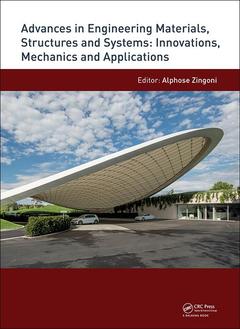Advances in Engineering Materials, Structures and Systems: Innovations, Mechanics and Applications Proceedings of the 7th International Conference on Structural Engineering, Mechanics and Computation (SEMC 2019), September 2-4, 2019, Cape Town, South Africa
Coordonnateur : Zingoni Alphose

Advances in Engineering Materials, Structures and Systems: Innovations, Mechanics and Applications comprises 411 papers that were presented at SEMC 2019, the Seventh International Conference on Structural Engineering, Mechanics and Computation, held in Cape Town, South Africa, from 2 to 4 September 2019. The subject matter reflects the broad scope of SEMC conferences, and covers a wide variety of engineering materials (both traditional and innovative) and many types of structures.
The many topics featured in these Proceedings can be classified into six broad categories that deal with: (i) the mechanics of materials and fluids (elasticity, plasticity, flow through porous media, fluid dynamics, fracture, fatigue, damage, delamination, corrosion, bond, creep, shrinkage, etc); (ii) the mechanics of structures and systems (structural dynamics, vibration, seismic response, soil-structure interaction, fluid-structure interaction, response to blast and impact, response to fire, structural stability, buckling, collapse behaviour); (iii) the numerical modelling and experimental testing of materials and structures (numerical methods, simulation techniques, multi-scale modelling, computational modelling, laboratory testing, field testing, experimental measurements); (iv) innovations and special structures (nanostructures, adaptive structures, smart structures, composite structures, bio-inspired structures, shell structures, membranes, space structures, lightweight structures, long-span structures, tall buildings, wind turbines, etc); (v) design in traditional engineering materials (steel, concrete, steel-concrete composite, aluminium, masonry, timber, glass); (vi) the process of structural engineering (conceptualisation, planning, analysis, design, optimization, construction, assembly, manufacture, testing, maintenance, monitoring, assessment, repair, strengthening, retrofitting, decommissioning).
The SEMC 2019 Proceedings will be of interest to civil, structural, mechanical, marine and aerospace engineers. Researchers, developers, practitioners and academics in these disciplines will find them useful. Two versions of the papers are available. Short versions, intended to be concise but self-contained summaries of the full papers, are in this printed book. The full versions of the papers are in the e-book.
1. Keynotes
2. Dynamic analysis, vibration response, vibration control, environmental vibrations, human-induced vibrations
3. Seismic response, seismic analysis, earthquake-resistant design
4. Material modelling, multi-scale modelling, porous media, composite materials, functionally graded materials
5. Micromechanics of advanced materials and processes, manufacturing processes, assembly processes
6. Composite structures, laminated structures, sandwich structures
7. Numerical schemes, numerical simulations, computing, finite element modelling, finite element analysis
8. Damage mechanics, damage modelling, fracture, fatigue
9. Renewable energy structures, fluid-structure interaction
10. Blast, impact, shock and explosion loading
11. Stability of beams, columns and thin-walled sections
12. Plates, shells, membranes, cables, cable-stayed structures, lightweight structures, space structures
13. Adaptive structures, smart structures
14. Cold-formed steel structures, stainless steel structures, aluminium structures
15. Steel structures, steel connections, steel-concrete composite construction
16. High strength steel, high performance steel
17. Reinforced concrete structures, prestressed concrete
18. High strength concrete, high performance concrete, fibre-reinforced concrete
19. Structural applications of FRP composites
20. Mechanics of concrete, properties of concrete, construction materials, construction technology, pavement design
21. Masonry structures, glass structures, timber structures, properties of wood
22. Railway bridges, railway infrastructure, highway bridges
23. Performance of structures in fire, design for fire resistance
24. Structural health monitoring, damage detection, system identification, maintenance, durability, long-term performance
25. Structural assessment, historic structures, collapse behaviour, failure analysis, repair, strengthening, retrofitting
26. Soil-structure interaction, foundations, underground structures, geotechnical engineering, rock mechanics
27. Safety and reliability, structural design, architectural considerations, building technology, structural engineering education.
Alphose Zingoni earned an MSc (with distinction) and a PhD from Imperial College London in 1992, and was a recipient of a prestigious postdoctoral fellowship of the Royal Commission for the Exhibition of 1851 from 1992 to 1994. He held appointment as Dean of the Faculty of Engineering at the University of Zimbabwe from 1996 to 1999, before moving to the University of Cape Town in 1999, where he served as Head of the Department of Civil Engineering from 2008 to 2012.
His research spans shell structures, vibration analysis, studies of symmetry in structural mechanics, and group-theoretic formulations. He has written numerous scientific papers and four books in these areas, and serves on the editorial boards of several international journals. He is founder, chair and editor of the Structural Engineering, Mechanics and Computation (SEMC) series of international conferences, successfully held in Cape Town every 3 years since 2001.
In recognition of his outstanding contributions, three learned societies have elected him a Fellow: the South African Academy of Engineering, the Institution of Structural Engineers (London), and the International Association of Bridge and Structural Engineering (Zurich). He received a B1 rating of the National Research Foundation in 2016, and in the same year, was elected a Fellow of the University of Cape Town in recognition of "original distinguished academic work".
Date de parution : 08-2019
17.4x24.6 cm
Disponible chez l'éditeur (délai d'approvisionnement : 14 jours).
Prix indicatif 456,06 €
Ajouter au panierThème d’Advances in Engineering Materials, Structures and... :
Mots-clés :
Boundary Element Methods, Cable Nets and Membrane Structures, Case Studies of Structural Failures, Computational Structural Mechanics, Computational Wind Engineering, Computer-Aided Design, Concrete and Masonry Structures, Construction Technology and Methods, Damage Mechanics, Fracture and Fatigue, Design for Blast and Impact Resistance, Design for Earthquake Resistance, Design for Fire Resistance, Design for Wind and Storm Resistance, Design of Thin-Walled Sections, Durability and Long-Term Per



